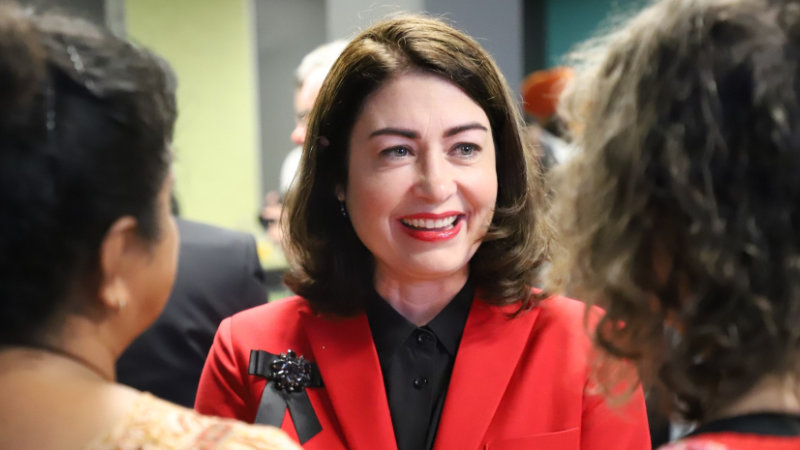The Greens are a chance to go big this election. More senators seem to be a cert, while in the House, the Teal independents are amplifying their message on environmental issues, if not economic ones. Australia’s third party is determined to put a ‘terrible government’ to the sword. But in their 2022 hunting ground of Brisbane, the Greens are aiming to knock out the woman who would be Labor’s environment minister, writes Mark Sawyer.
Adam Bandt launched the Greens campaign at a microbrewery in Brisbane on Monday night. Yep, a microbrewery. No worries. Australia’s premier environmentalist political party finds its best harvest on the asphalt of the inner city. All good. We’re hipsters and we vote!
But seriously, the launch reflected the Greens’ confidence over their Queensland prospects. Three years ago, former leader Bob Brown led the Stop Adani convoy that antagonised many rural Queenslanders. That shored up the Coalition vote and saved the Morrison government.
Now, the Greens are riding high, with one poll giving them 13% support in the Sunshine State. The Teal candidates are harvesting climate votes in Sydney, Melbourne and Perth, but Brisbane is one election behind the trend. The Greens have their sights on the seats of Ryan, Griffith and Brisbane.
Bandt outlined the seven priorities for his party in any deal-making process should Saturday’s election result in a hung parliament. No.1 on the list is no new coal and gas mines. Leaving aside the fact that there is no such thing as a gas mine, that’s got to be good for the planet, considering Labor and the Coalition have left open the prospect of a combined 114 new coal mines and gas production plants.
The Coal Coalition: what if the majors cut their own deal? Stranger things have happened
What else? Dental care added to Medicare. Building a million homes and better rights for renters. Free childcare. Forgiving student debt. Income support above the poverty line. The Uluru Statement From the Heart.
The Greens have run the policies past Treasury and say they will cost $173,024 million between 2021-22 and 2024-25.
How will all that be funded? Well, there’s a tycoon tax and a billionaire’s tax. Then there’s the abolition of subsidies for the fossil fuel industry. That’s meant to save $182,732 million to 2024-25. And it means we’re ahead by $9,708,000.
The Greens won’t be making the defence budget an issue of any negotiations over their support of a new Labor government. With Labor in lockstep with the government on AUKUS and China policy (notwithstanding the petty name-calling), the Greens are saving the guns bit of ‘’guns and butter’’ for another day. Another policy where the Greens are not shouting from the rooftops is asylum seekers. Along with the carbon tax, this is the policy which drew the party into the most serious conflicts with the last Labor government.
An attractive story

Costings for the Greens seven priorities Source: adam-bandt.greensmps.org.au/
On the basis outlined above, Bandt has an attractive story to tell. Visionary, even. Billionaires paying for dental care on Medicare. Imagine, Clive Palmer and Gina Rinehart no longer gouging the landscape but filling in those gaps in our mouths.
So what’s the problem, apart from the money? (And the debt is going, the deficit isn’t going to be much different either way). It can be summed up in a name: Terri Butler.
Black Hops Brewing, where Bandt said all those great things on Monday, is in the electorate of Griffith, held by Butler, Labor’s environment spokeswoman. If Anthony Albanese is elected prime minister, she would be Australia’s environment minister, leading Labor’s charge to 43% emissions reductions by 2030, and trying to accelerate it. That’s if she survives the vigorous Greens campaign to oust her from her seat.
Butler’s vulnerability comes down to the iron laws of electoral arithmetic. Griffith, once held by Kevin Rudd, is now a soft seat for Labor. It overlaps the state electorate of South Brisbane, where the Greens won their second state seat at the 2020 election. Butler polled only 30.95% first preference votes at the 2019 election. Greens preferences saved her. Now the Greens are aiming to push her into third place, and rely on Labor preferences to defeat the Liberals (whose candidate received 40.97% in 2019). Pretty nifty, right?
Yes, the Greens are also targeting the Liberal National Party seats of Brisbane and Ryan, with Labor preferences of course. But considering they are targeting two of the 24 non-Labor seats in Queensland and one of the six Labor seats, they may end up saving that ‘‘terrible government’’ Bandt so deplores.
How? In a tight election, both Labor and Coalition can both reach a point where they can claim government in a minority, as long as they lead their opponent by enough seats to render any alliance talks futile. Putting it another way, a party could negotiate with a crossbench if it’s four seats weaker than its opponent, but not five.
When the numbers get tight
The hung parliament of 2010-13 has its champions, but it illustrates how weird things happen when the numbers are stretched as tight as a drum. When independent Andrew Wilkie withdrew his support from the Gillard government, saying he had been lied to over a promise to restrict poker machines, Labor was forced to turn to a Coalition renegade to keep the numbers. That person was Peter Slipper. The manoeuvres that led to Labor giving him the job of Speaker of the House of Representatives struck the public as a sleazy deal. Julia Gillard defended the deal in her famous misogyny speech. She became a global icon, but couldn’t save her prime ministership. Within a year of the speech, its target, Tony Abbott, was leading the nation.
An unlikely sequence of events that can be traced back to not having the numbers in parliament.
Judgment Day: It’s the economy, and the environment, and a better deal for the low-paid
So why do they want to knock off Labor’s environment minister? After all, the Greens’ negotiating stance with Labor can be boiled down to two sentences: ‘’Do what we say or we won’t support you. OK, we’ll support you.’’
But just as the Teal independents target moderate Liberals and say ‘’we’re doing it in your interests’’, the Greens apply the most pressure to Labor’s bedrock seats. Even Anthony Albanese has had to fend off strong campaigns in his inner Sydney electorate of Grayndler, where the Greens have hovered around 20% of the primary vote for six straight elections.
Bandt is hoping to reprise the working arrangement he had with Albanese in what Bandt glowingly calls a ‘’power-sharing parliament’’. In the last such parliament, the 2010-13 one, Bandt was the new MP for Melbourne and Albanese was leader of the house, the Gillard government’s chief parliamentary negotiator, its dangerman.
Bandt may have to take back some of the unkind things he has said about the ‘’visionless’’ opposition. And perhaps, if Labor does fall short, explain why the Greens so needed to knock off Terri Butler to give Australia a better government.
“The Greens formed a government in Tasmania with the Liberals,” Albanese said on Monday.
“And I want Terri Butler re-elected because she as environment minister will do more for the environment than any Green sitting next to keep Adam Bandt company ever will.”
Mark Sawyer is a journalist with extensive experience in print and digital media in Sydney, Melbourne and rural Australia.

